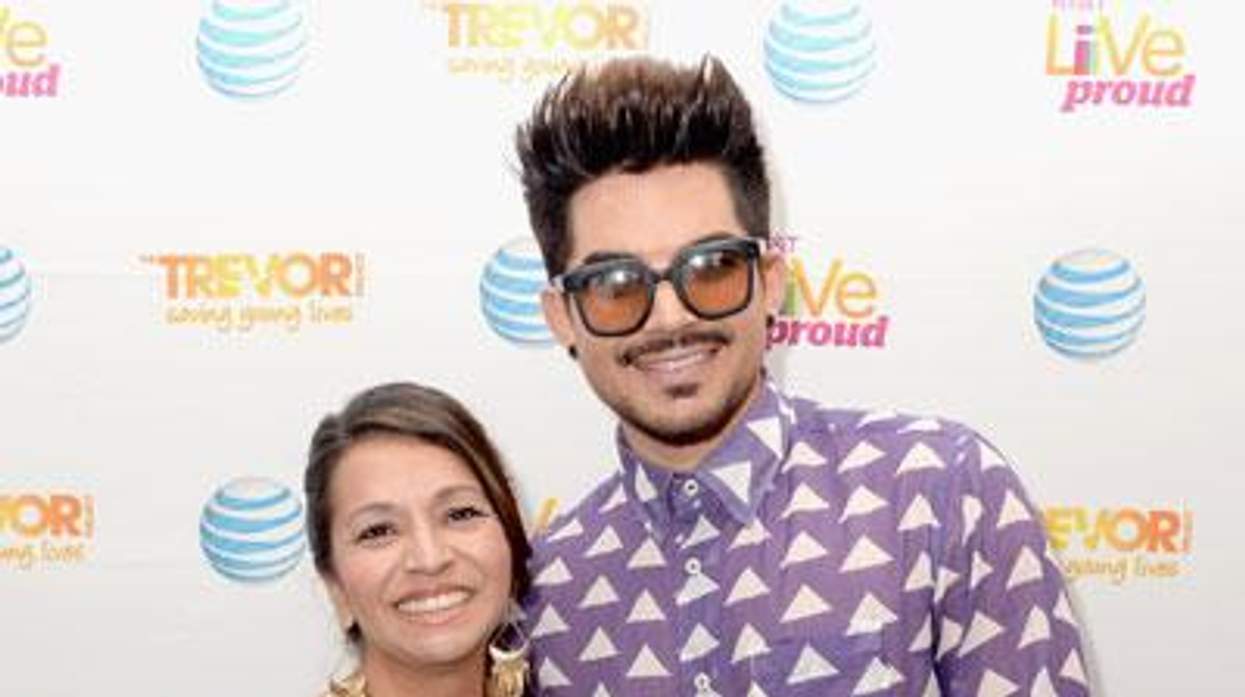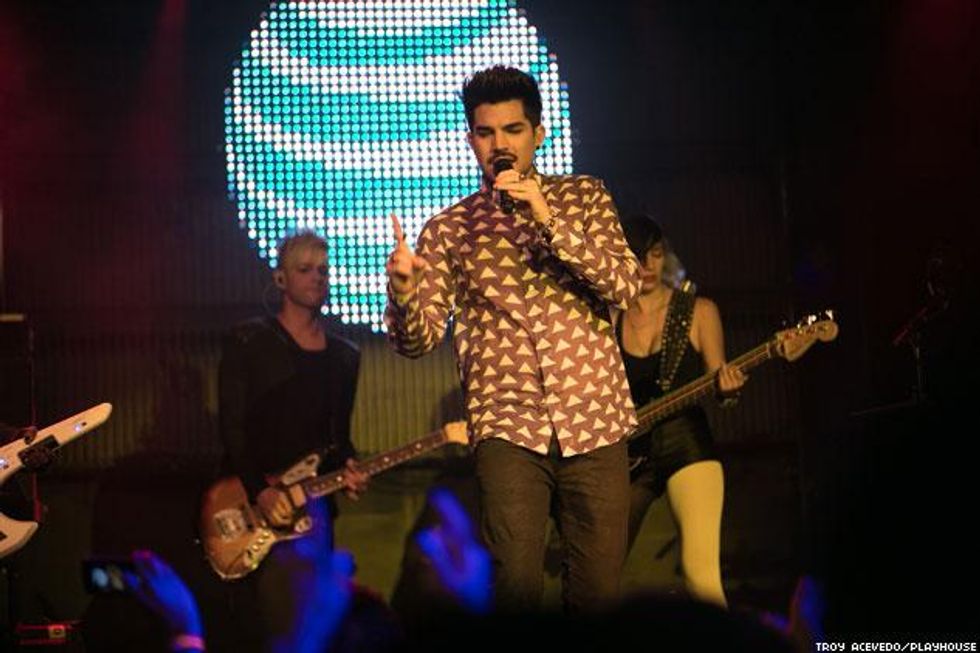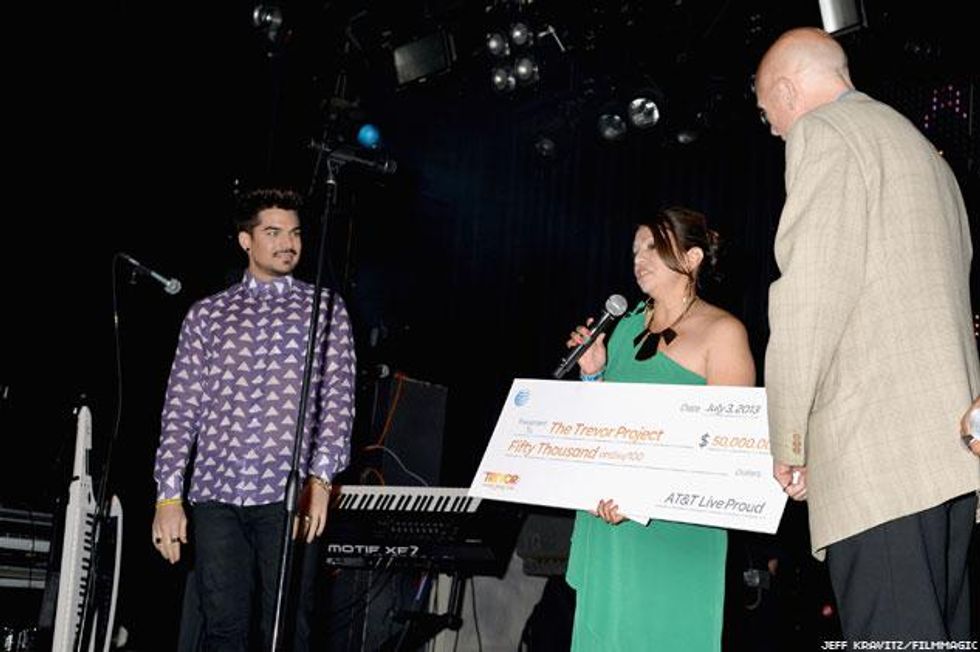Adam Lambert's album, Trespassing, debuted last year at number one, a first for an openly gay man, and he credits the fans. But times are clearly changing. Gay.net spoke with the singer shortly after the Supreme Court ruled the Defense of Marriage Act unconstitutional. "Finally," he said, "we're making steps."
On July 3, AT&T's Live Proud campaign and Lambert presented The Trevor Project a check for $50,000 in honor of the organization's efforts in suicide prevention for LGBT youth. Lambert brought the house down with his band as the audience got on their feet for a great cause.
The Advocate spoke with Lambert just before his performance. We discussed the need for more out celebs like him, being a role model, and how the hold-outs who haven't yet embraced equality will one day "get over it."
The Advocate: Do you think it's important to have more out celebrities, especially now?
Adam Lambert: I do, you know I would like to see more out celebrities, but I do know that it's difficult in the entertainment industry to be out. It's not always easy....
People have certain assumptions they make, especially for actors and actresses. I think the big challenge for a lot of them, is they want to be believable when they play this type of character, because unfortunately some people can't see past orientations. But I think with things like this, with DOMA being overturned, and progress being made, and more visibility being out there, I think we can move to a time where it isn't that big of an issue. It's just a bit tricky right now.
You were actually among the rare ones to spring into fame already out.
I didn't want to do it any other way. First of all, I can't imagine keeping that secret. Not only would it have been a pain in the ass, but it's just not who I am. I'm an open book, I wanted to be up front. Plus I was living my life for 10 years here in L.A. out and proud. So there was no way I was going to go back in the closet. That would have been ridiculous.
In the media, do you think it's important to have gay charactersor gay celebrities?
I think public opinion has shifted a lot because of what the media has been doing. TV and film have been writing a lot more gay characters in their storylines. I think that's been helping the main public understand it a little bit and get over it.
What does The Trevor Project mean to you?
I love what they're doing, how they're reaching out to human people. I think with social media being such a powerful tool now, there are places in this country and around the world where gay men and women don't have a voice and they don't have a way of connecting with each other. Social media has changed that. For people like me, who have visibility and celebrity on my side, to be able to get a message out to them, I think is very powerful. To encourage them to be who they are and that they're not alone.
You're a role model for a lot of people. How would you define a role model?
There are different kinds of role models. There's the exemplary person who is morally amazing and does everything right, then there's the role model who says, "I'm flawed, I'm crazy and cooky, but I want people to be who they want to be." That's been my mission this whole time, to encourage people to be who they are. Don't mimic me, I'm not your example. I'm only trying to get people to do what they want.
Your parents were so supportive, others' parents unfortunately aren't so supportive. What would you say to those parents?
I think a lot of older generation parents believe that the life of a LGBT person is going to be really hard and fraught with all this turmoil. Well, most of that turmoil comes from a family rejecting them, so the first step is a family embracing a person for who they are. And that's not that hard. You look around major cities around the country, it's not hard. There's great community, great support system, and there's a lot of gay kids out there. It's not that difficult.
Yeah, that's why a lot of gay people come to big cities.
I mean, I definitely feel for people who are in parts of the country where they're the only one. Or think they're the only one. That's hard.
That's why people like you are good for them.
Yeah, and that's what Facebook is for, what Twitter is for. Connect with people. Reach out, and make friends.








































































Charlie Kirk DID say stoning gay people was the 'perfect law' — and these other heinous quotes